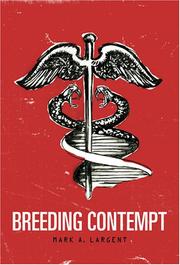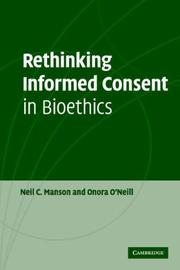| Listing 1 - 3 of 3 |
Sort by
|

ISBN: 9780765803795 0765803798 Year: 2007 Publisher: New Brunswick, N.J. : Transaction Publishers,
Abstract | Keywords | Export | Availability | Bookmark
 Loading...
Loading...Choose an application
- Reference Manager
- EndNote
- RefWorks (Direct export to RefWorks)
Psychiatry --- Involuntary treatment --- Mentally ill --- Psychiatrie --- Traitement non volontaire (Thérapeutique) --- Internement (Psychiatrie) --- History --- Commitment and detention --- Histoire

ISBN: 1281151424 9786611151423 0813543800 9780813543802 9781281151421 6611151427 9780813541822 0813541824 9780813541839 0813541832 Year: 2007 Publisher: New Brunswick, NJ
Abstract | Keywords | Export | Availability | Bookmark
 Loading...
Loading...Choose an application
- Reference Manager
- EndNote
- RefWorks (Direct export to RefWorks)
Most closely associated with the Nazis and World War II atrocities, eugenics is sometimes described as a government-orchestrated breeding program, other times as a pseudo-science, and often as the first step leading to genocide. Less frequently it is recognized as a movement having links to the United States. But eugenics does have a history in this country, and Mark A. Largent tells that story by exploring one of its most disturbing aspects, the compulsory sterilization of more than 64,000 Americans. The book begins in the mid-nineteenth century, when American medical doctors began advocating the sterilization of citizens they deemed degenerate. By the turn of the twentieth century, physicians, biologists, and social scientists championed the cause, and lawmakers in two-thirds of the United States enacted laws that required the sterilization of various criminals, mental health patients, epileptics, and syphilitics. The movement lasted well into the latter half of the century, and Largent shows how even today the sentiments that motivated coerced sterilization persist as certain public figures advocate compulsory birth control-such as progesterone shots for male criminals or female welfare recipients-based on the same assumptions and motivations that had brought about thousands of coerced sterilizations decades ago.
Eugenics --- Involuntary sterilization --- Castration of criminals and defectives --- Compulsory sterilization --- Eugenic sterilization --- Sterilization, Eugenic --- Sterilization of criminals and defectives --- Involuntary treatment --- Sterilization (Birth control) --- Reproductive rights --- History.

ISBN: 9780521697477 9780521874588 0521697476 0521874580 9780511814600 9780511286247 0511286244 0511285507 9780511285509 0511814607 9780511284700 0511284705 1107172314 1280909463 9786610909469 0511283903 0511321120 Year: 2007 Publisher: Cambridge New York Cambridge University Press
Abstract | Keywords | Export | Availability | Bookmark
 Loading...
Loading...Choose an application
- Reference Manager
- EndNote
- RefWorks (Direct export to RefWorks)
Informed consent is a central topic in contemporary biomedical ethics. Yet attempts to set defensible and feasible standards for consenting have led to persistent difficulties. In Rethinking Informed Consent in Bioethics, first published in 2007, Neil Manson and Onora O'Neill set debates about informed consent in medicine and research in a fresh light. They show why informed consent cannot be fully specific or fully explicit, and why more specific consent is not always ethically better. They argue that consent needs distinctive communicative transactions, by which other obligations, prohibitions, and rights can be waived or set aside in controlled and specific ways. Their book offers a coherent, wide-ranging and practical account of the role of consent in biomedicine which will be valuable to readers working in a range of areas in bioethics, medicine and law.
Informed Consent --- Informed consent (Medical law) --- Bioethics. --- Medicine --- Consentement éclairé (Droit médical) --- Bioéthique --- Médecine --- ethics. --- Research --- Moral and ethical aspects. --- Recherche --- Aspect moral --- Bioethics --- Moral and ethical aspects --- Informed consent (Medical law). --- Consentement éclairé (Droit médical) --- Bioéthique --- Médecine --- Health Workforce --- Consent, Informed --- Consent to treatment --- Disclosure, Medical --- Medical disclosure --- Treatment, Consent to --- Consent (Law) --- Medical ethics --- Medical personnel --- Patient education --- Involuntary treatment --- Patient refusal of treatment --- Biology --- Biomedical ethics --- Life sciences --- Life sciences ethics --- Science --- Research&delete& --- Malpractice --- Arts and Humanities --- Philosophy --- Medicine - Research - Moral and ethical aspects --- Droit médical
| Listing 1 - 3 of 3 |
Sort by
|

 Search
Search Feedback
Feedback About UniCat
About UniCat  Help
Help News
News